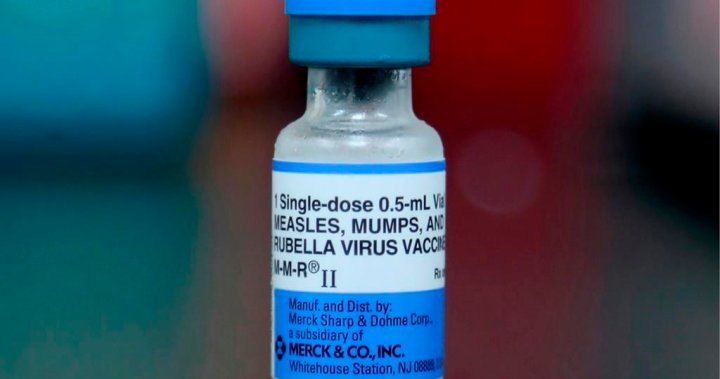During Wednesday’s videotaped announcement of policies targeting Alberta’s trans community, Premier Danielle Smith said one of those policies would prohibit trans women from competing in womens’ sports.
Smith suggested a trans athlete has “advantages” over their cisgender counterparts.
“There are obvious biological realities that give transgender female athletes a massive competitive advantage over women and girls,” Smith said Wednesday.
The scientific literature disagrees, even with the existence of high-profile cases.
Caster Semenya of South Africa was questioned about her athletic performance and her higher testosterone levels. Semenya has an intersex condition where normal male internal structures are not fully developed while an embryo, resulting in external genitalia that appear female or ambiguous at birth.
At 18, Semenya set personal, national and championship records in the 800-metre race, including at the 2009 IAAF Athletics World Championships, wins that brought up questions about her sex. World Athletics, the body formerly known as the IAAF, asked her to take a sex verification test.
She was denied the ability to race for nearly a year while the test results were being analyzed.
Semenya was the flag-bearer for South Africa at the 2012 Olympics, and Semenya’s silver in the 800-metre race was upgraded to gold when Russian Mariya Savinova’s top result was disqualified for doping at the games. Semenya would go on to also win gold in the same race in the 2016 Rio Olympics.
Semenya also won her discrimination case originally filed against the IAAF rules in a European court, a case which included an amicus brief from Human Rights Watch arguing the regulations “perpetuate the arbitrary scrutiny of women’s bodies in ways that are degrading and invasive of privacy, on grounds that are scientifically contested.”
Semenya was assigned female at birth, has XY chromosomes, but identifies as a woman. As she wrote in the New York Times in October 2023, she calls herself “a different kind of woman” and rejects the intersex label.
Her case is brought up for its profile, but with an important caveat: Semenya is not trans and is an Olympic-level athlete.
According to a 2022 review of scientific literature done by the Canadian Center for Ethics in Sport, a study into the biomedical argument that testosterone measures and boundaries, typically used to determine manhood and womanhood in sport, had inconclusive results.
There’s little scientific understanding about how hormone replacement therapy affects the athletic ability of trans women athletes, and the biological data about hormones and performance is often methodologically flawed, the report said.
Get the latest Health IQ news.
Sent to your email, every week.
The idea that testosterone suppression – like what Semenya undertook for years that left her feeling “constantly sick” – is a practice that has limited evidence, with some studies using misleading data or ignoring contraindicating evidence.
“There is no firm basis available in evidence to indicate that trans women have a consistent and measurable overall performance benefit after 12 months of testosterone suppression,” the report reads.
The CCES study also noted that social factors have a greater impact on athletic performance than hormones.
“Researchers in the sociocultural field of study argue that social factors contribute to performance advantages to a far greater extent than does testosterone and that assessing testosterone levels is another way to perpetuate the long history of policing women’s bodies in sport,” the report reads.
“Researchers highlight the many social factors that contribute to differences in athletic performance, including, for example: discriminations, disparate resource allocations, inequities, and violence against women in sport in the forms of sexism and sexual violence in sport contexts, arbitrary differences in rules and equipment between men’s and women’s sport, as well as histories of barring women from certain sports.”
An October 2023 review of the current body of research around trans athletes in sports showed that any “advantage” in aerobic capacity, strength and endurance in a trans person declines soon after hormone therapy begins.
One study used army-style fitness assessments to compare cis and trans men and women. Following two years of gender affirming hormone therapy, trans men didn’t do better at pushups or a 2.4-kilometre run when compared to their cisgender counterparts, but completed more sit-ups, on average. Trans women in the same scenario did no better than their cis counterparts at push-ups or sit-ups, but did produce better run times.
Two years later, those differences in performance had disappeared.
“Trans men and trans women continually performed more similarly to their affirmed cisgender performance averages, and approach their own pre-transition percentile scores over the four years of gender affirming hormone therapy,” D.J. Oberlin writes in the paper.
The Lehman College assistant professor said the disproportionate focus on trans athletes seems to be based on the idea that cis men who are unable to succeed in sports against other cis men, would choose to misidentify as a trans woman to gain an advantage in sports against cis women.
“However, there are no legitimate cases of this occurring,” Oberlin wrote. “An individual’s sex does not determine their success or failure at any athletic event despite the high level of competition.”
Oberlin also noted the very low instance of trans athletes, partially due to their low representation in the population.
The 2021 census showed Alberta’s trans population only amounted to 0.22 per cent of the entire province, half of which are trans women, and non-binary persons were another 0.15 per cent. Numbers nationwide were very similar.
The Canadian Centre for Ethics in Sport issued advice to any governments or sporting bodies considering policies for trans people in sport.
“Any policy developed should carefully consider the current lack of participation of trans athletes (in many sport organizations there is a complete absence or outright exclusion) and balance the value of fairness with inclusion,” it said.
“In the Canadian Trans Youth Health Survey from 2019, we saw that over 80 per cent of trans and gender diverse youth stop all forms of sporting activities because of the discrimination they face,” Amelia Newbert, co-founder of Calgary-based trans and gender diverse supporting Skipping Stone Foundation, said.
© 2024 Global News, a division of Corus Entertainment Inc.




